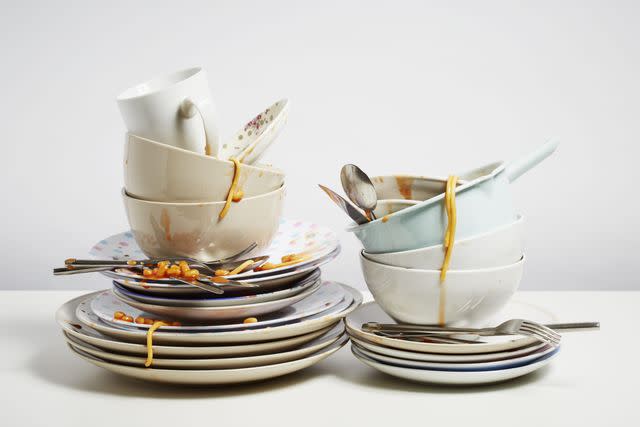6 Reasons You Shouldn’t Wash Dirty Dishes By Hand
Back away from the sponge.
There will always be a degree of reverence surrounding the old-fashioned way of doing things, especially among the proud people of the South. If it ain't broke…right? But just because your grandmother did something one way, doesn't necessarily mean it's the best way.
Older generations can be skeptical of modern technology. We get it. But when it comes to washing dishes, science has proven that running the dishwasher is superior to hand-washing in more ways than one. Sorry, Mawmaw! Here's why the dishwasher is your friend and why you should be using it to wash your dirty dishes.

Kill the Bacteria
To start, when hand-washing, you simply can't get water hot enough to make the dishes entirely bacteria-free. The water temperature recommended by the U.S. Department of Agriculture to sanitize dishes is 140 degrees Fahrenheit, which is too hot and dangerous for hands. Your dishwasher can effectively clean at this temperature or higher.
Save Water and Money
There's also the issue of water consumption. Hand-washing can't compete there either. According to the Natural Resources Defense Council, washing dishes by hand can use up to 27 gallons per load. The council reports that an Energy Star-certified dishwasher can use as little as three gallons of water per load, despite constantly spraying water. Even older dishwashers only use 10 to 15 gallons! And it adds up. An energy-efficient dishwasher can save more than 8,000 gallons of water per year compared to hand-washing. It also cuts your energy bill.
Ditch the Sponge
We have to talk about kitchen sponges, A.K.A. the single dirtiest item in your house. Really.
A 2017 study by Scientific Reports found that kitchens have more bacteria than toilets. “This was mainly due to the contribution of kitchen sponges, which were proven to represent the biggest reservoirs of active bacteria in the whole house,” the study says.
Sponges need to be sanitized, which many people do not do. Seriously, using a dirty sponge to clean a dish probably leaves the dish dirtier than it was before you scrubbed it. Gulp.
Save Time
After cooking a fantastic meal, do you really want to spend more time washing dishes? Neither do we. Trust the dishwasher and load it up. The average dishwasher cycle can last an hour or more, but it’s time you don’t have to spend with the dishes. That’s time to plan your next meal, take a walk, or get the kids to bed.
Save Your Hands
Washing dishes by hand can take a toll on your hands. If you have dry or sensitive skin or a fresh manicure, all of that hot water and dish soap can give your skin and nail polish a beating. Gloves help protect your hands, but why not load up the dishwasher and give your hands a break?
Don't Pre-Rinse
Last but not least, you can load your dishes straight from the table into your dishwasher. Scrape away any excess food so it doesn’t clog the dishwasher drain, but there’s no need to rinse for newer machines made after 2000. The detergent actually works better when it has something to cling to.
Know When To Hand-Wash
There may be times when you really do need to wash dishes by hand. A dishwasher or detergent can be too hard on your antique heirloom china, sharp knives and blades, and delicate items, like hand-painted dishes. The paint, finish, and blades can fade and dull.
Items like wood and cast iron also shouldn’t be put in the dishwasher, which can cause damage to their surfaces over time.
You may also need to wash by hand to get rid of tough stains. A dishwasher can’t remove stuck-on grime from burned food. Getting rid of caked-on food may take some scrubbing on your part.
If you only have a small load, hand washing may be the best choice for cleaning dirty dishes. Don’t let dishes sit for more than a few days in the dishwasher. Dirty dishes are a breeding ground for bacteria, and it’s best to wash them sooner rather than later.
Wash the Right Way
When you do need to hand-wash, there is a right way to clean that sink full of dirty dishes. Make sure to follow these tips for handwashing. Fill your sink with enough warm water to cover your dishes, and add dish soap. Leave sharp items like knives for last so you don’t cut yourself. Use a clean dishcloth or silicone scrubber to wash each dish, and rinse with warm water. A bottle brush and dish brush can be used for hard-to-reach places and stubborn spots. Dry with a towel or air-dry on a drying rack.
For more Southern Living news, make sure to sign up for our newsletter!
Read the original article on Southern Living.

